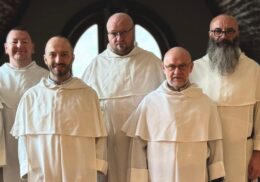You may have wondered where I’ve been these past weeks. I could not have been in a more glamorous locale: Milwaukee – for a family wedding.
A wedding draws in not only all the branches of our big Catholic clan (I was the first of eight children and now have 18 nieces and nephews) but also odd uncles and cousins and old friends of my parents. There are usually at least three priests present, since my family likes priests for some reason. And I, trying to look demure in my big polyester Dominican cappa, am a magnet for nosy questions about who I am, what I do, and why.
I always end up talking about Poland. In the middle of America, lots of people have Polish ancestry, but almost no one knows anything about Poland. To them it is a wispy Ruritania hovering somewhere east of Berlin and west of Moscow. Famous Poles? Wojtyła, Wałęsa, Chopin, and Madame Curie – in that order. Polish food? Cabbage. Polish history? Auschwitz, then Solidarność. A Polish film? Someone might mention Yidl mit’n Fidl (1936) or The Last Polka (1985).
Ignorance abounds.
And so, though I am sometimes called upon to answer contentious religious questions – as anyone in a habit is, especially these days – I most often fall into the role of amateur diplomat for Poland. It is a role to which I have become accustomed over the past 15 years.
Last week, when people asked me what Poland is like, I usually said: it’s the last Christendom. That’s a new answer, but I think it apt.
The last Christendom. Last in the world.
The Americans knew what I meant.
Only an American living in Poland could come up with such a formulation. Poles themselves would be embarrassed to think such a thing, let alone say it. For while there is no shortage of patriotism in Poland (as a tenor in the schola, how many times have I rendered “Boże, coś Polskę” at Mass?), Poles have ingrained humility verging on a Minderwertigkeitskomplex.
And yet, dear Polish reader, as hard as it may be to hear, you are indeed living in the last Christendom. Flawed though it is, Poland is the last country that was Christian in the Middle Ages and is Christian now; the last place where the Christian faith informs a whole social order.
If this seems grandiose, consider that Poland comes to this distinction not only by its own virtue but from a lack of competition. Broadly speaking, the Church lost the English and Germans in the 16th century (they tried Protestantism awhile and then gave up God entirely), the French after 1950, Spanish after 1975, Italians after 1980, and Irish after 1995. You could play tennis in a Swiss cathedral on Sunday morning and not hit anyone with the ball. Christian architecture? They’ve got plenty. Christians? Uhmmm….
Friars in habit who escape the priory to walk on the street are gawped at like green parrots that somehow flew in from the Amazon.
Once, in Fribourg, I calculated with French Dominicans the total population of the Catholic Church in France. French Catholics are fond of calling France the “eldest daughter of the Church” and muttering something about Clovis. Very well. But how many people actually make up this splendid Church of France? Counting everyone: bishops, priests, every nun in the attic, all the organists, and anyone who goes to mass more than twice a year – how many? Maybe five million. Maybe six. Sounds more like a club than a Church.
And in Poland? Lame catechesis in the public schools. Clerics who seem like exhibits from an ethnographical museum. A general feeling of impending crisis. And yet: long queues to the confessional, lively Catholic journals and websites, young families in the pews, and monasteries that not only sell honey and soap but also have monks in them.
…
I am spending this academic year as one of a few brothers from the Polish Province coordinating the Dominican response to the World Youth Day in Krakow in July 2016. World Youth Days make me think of the pope who invented these “Days” – Saint John Paul. But even without the context of my daily work on this event, how can I forget about the old Pope in this country where the man’s face gazes down like a beatific pumpkin from so many paintings and plaques? John Paul is the only canonized saint I have ever touched and spoken to. I attended his World Youth Days when I could still legitimately be called “youth.” I see how Poland changed during his pontificate (unquestionably for the better) and how it has changed since his death (materially better, otherwise uhmmm…).
And now? The man is gone, but he’s praying for you.
I suppose my message to the Poles is: I am counting on you. Many are.
Counting on you — because a lot depends on Poles and Poland. But please, Poles, don’t feel burdened. The Polish people was not put on earth to curate the Church – to preserve it like monks saving manuscripts from the Ostrogoths.
No one is asking you to do that, because that whole model is bunk. In fact, the Church is not an institution to be served.
Because the Church isn’t them, it’s us: Ecclesia means assembly, and we do Church, God and us together. We don’t manage the Church; we participate in it. And we’re all stumbling towards glory in a grand outlandish dance.
To vary the metaphor: the Church is created daily, as often as new hosts are consecrated on the altar – as often as that plain wafer made of paste becomes the Body of Christ. It happens every minute, and it’s not by accident that God works this wonder through the work of human hands.
So here we are in Poland, the last Christendom on earth. Somewhere among the ugly housing blocks of the old order and the vapid pleasure palaces of the new, stalwart sisters stomp through on their way to adoration and little children imitate granny in making the sign of the cross.
And it could all be gone tomorrow.
Because a Christendom, and a Church, is a living thing. It is never won once and for all. To live, it needs the living. It needs our partaking and our participation. Stop dancing, and you’ll look around and ask: where’s the dance?












It is a very uplifting insight into our Polish mentality and attitude towards Church life, thank you for sharing your thoughts. Past two years I got engaged with the Church more than before – preparing catechesis and various activities (about the matter of faith, explaing who is God and how we can have our relationship with Him) for (young) children. And what I noticed is that there are more people like my family and families of my friends who are tired of being passive and distanced from Church’s core. I am noticing an important change that is coming from the bottom and I think it would be getting stronger leading to the point where Church gets refreshed from inside – being filled with people who are not afraid to act, move, change and, sort of, get out of their comfort zone to be closer to God, to brothers and sisters in faith, to show and prove communion with Church without rigid divisions for secular and cleric believers (in a sense of equality, yet with the respect for clerical knowledge).
Polska ostatnim bastionem? A co z Ameryką, a raczej z obiema Amerykami, co z Azją, Afryką. Wszystko już padło?